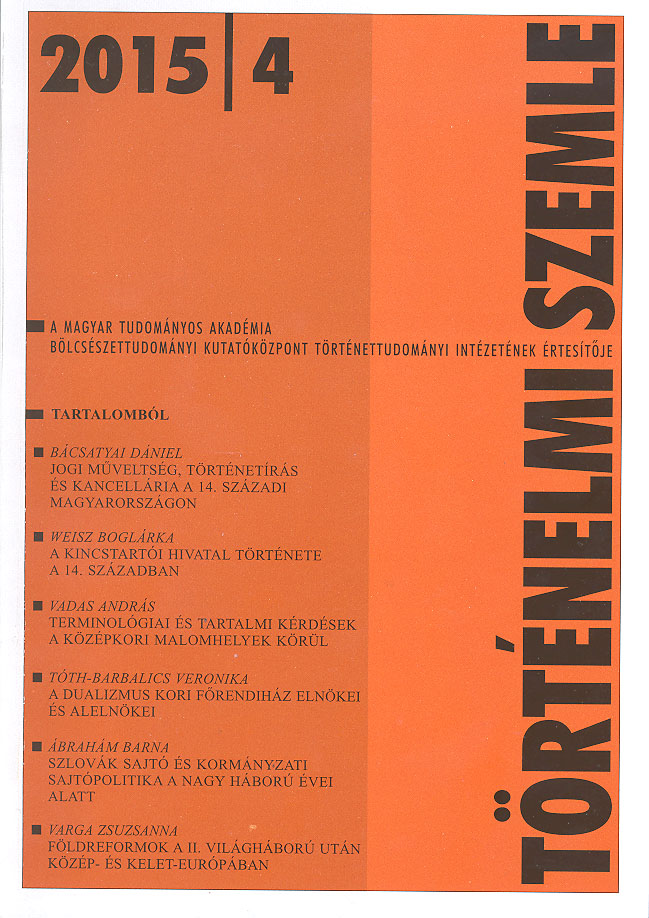 The fourth issue of Historical Review for 2015 has been published.
The fourth issue of Historical Review for 2015 has been published.
Boglárka Weisz’s study is a thorough analysis reexamining and questioning the thesis that he emergence of the treasurer’s office in the Hungarian Kingdom in 14th century could be explained by an increase in the competences of the magister tavarnicorum. Veronika Tóth-Barbalics’ paper examines the selection, functions and activities of the leading functionaries of the Upper House of the Hungarian parliament, applying the methods of biography and prosopography. Barna Ábrahám’s essay aimes to give an overall picture of the situation, frameworks and possibilities of Slovak press during the First World War. Zsuzsanna Varga examines the land reforms in the countries of Central and Eastern Europe after 1944 in a chronological order with attention to different aspects, e.g. the social groups which were deprived of their landed wealth, the beneficiaries, the arable lands, regional differences, the procedure itself etc. Dániel Bácsatyai’s study tries to demonstrate that the prologue of the Illuminated Chronicle - a remarkable artefact of 14th century Hungarian historiography - contains a lengthy quotation from pope Boniface VIII’s decretal collection, the Liber Sextus, which might shed some light upon the author’s learning. The aim of András Vadas’ paper is to draw attention to the complexity of the regulations and customs regarding the construction of water-mills on rivers in medieval Hungary. Orsolya Manhercz’ study examines the circumstances of the visit of Austrian emperor (and Hungarian king) Francis Joseph to Hungary in 1852, characterizing the great emphasis on the evocation of the Hungarian revolution and fight for independence of 1848–1849 and the ambivalence caused by the contrasting emotions evoked by the revolution and the consequent events.
CONTENTS
STUDIES
Boglárka Weisz: Who Was the First Treasurer? The History of the Treasurer’s Office
in the 14th-Century
Veronika Tóth-Barbalics: The Presidents and Vice-presidents of the Upper House during
the Dual Monarchy (1867–1918)
Barna Ábrahám: Slovak Press and Government Press Policy in the Years of the Great War
Zsuzsanna Varga: Land Reforms in Central and Eastern Europe after World War II
WORKSHOP
Dániel Bácsatyai: Legal Education, Historiography and Chancellery in 14th-Century Hungary
András Vadas: Questions of the Terminology and Meaning of the Term locus molendini
in the Middle Ages
Orsolya Manhercz: Re-acting the Trauma of 1848‒1849 during the Imperial Visit of 1852
Történelmi Szemle (Historical Review) is a periodical of the Institute of History of the Research Centre for the Humanities at the Hungarian Academy of Sciences. The language of the journal is Hungarian, but each article includes an abstract in English. Subscriptions can be made at any Hungarian post office, but issues of the journal (including older issues) can be bought or ordered from the Institute as well (postal address: MTA BTK Történettudományi Intézet, 1014 Budapest, Úri u. 53.; telephone: 224-6700/626; e-mail address: ).


